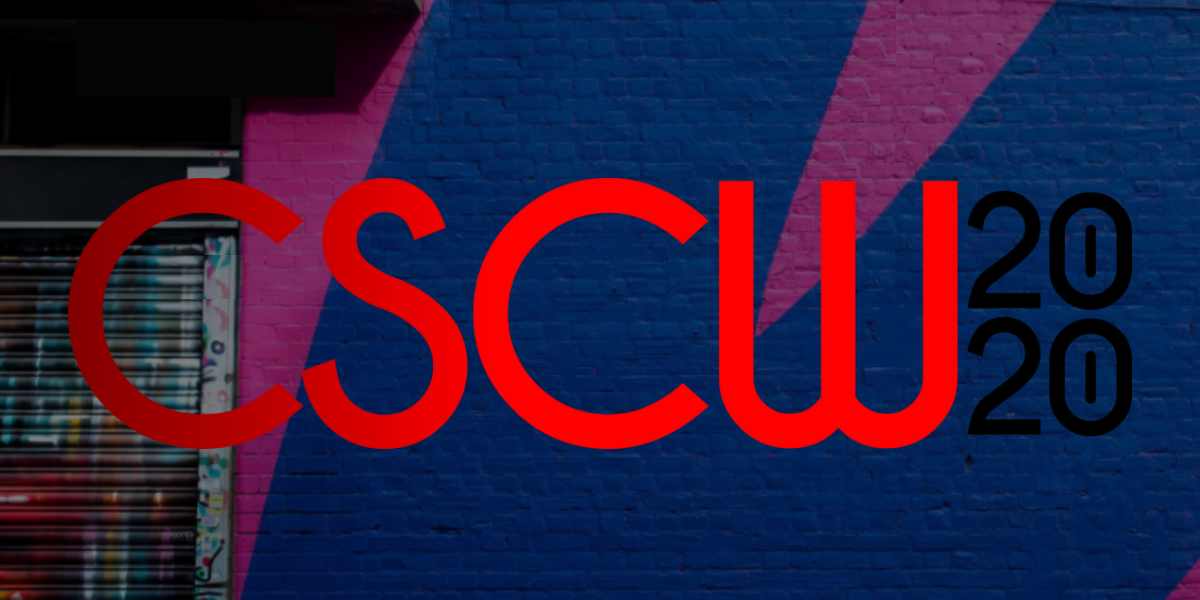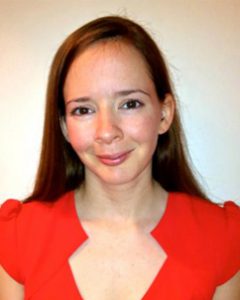UMD iSchool's Dr. Jessica Vitak discusses the college's robust participation in the ACM's prestigious CSCW 2020 Conference.


Dr. Jessica Vitak, UMD iSchool Associate Professor
As with most 2020 conferences, the ACM Conference on Computer-Supported Cooperative Work and Social Computing (CSCW) shifted to a fully virtual format this October. This was a difficult decision, but the organizing committee acted quickly after the pandemic lockdown began to create a virtual conference experience that optimized information sharing and networking opportunities for attendees. (Note: if you’re interested in reading more about how the organizing committee took CSCW virtual, see this Medium post.)
Nearly 900 social computing scholars from six continents participated in CSCW across five days — more than any prior conference, providing a silver lining to the virtual format.
CSCW was held over five days in October and was virtually co-located with UIST (ACM User Interface Software and Technology Symposium), which added additional layers of complexity with scheduling. However, nearly 900 social computing scholars from six continents participated in CSCW across five days — more than any prior conference, providing a silver lining to the virtual format.
I’ve been a member of CSCW’s organizing committee four times, and while I certainly missed having face-time with friends and colleagues, I thought the conference was about as successful as you could expect given the circumstances.
Members of UMD’s iSchool were well represented at the conference. Below, I’ve summarized the various contributions from iSchool members.
Organizing Committee
Two iSchool members were part of the organizing committee and helped shift the conference from in-person to online. I was a co-chair for the doctoral consortium, which hosted 21 PhD candidates and seven faculty mentors. Over the 4.5 hour event on October 18, student participants—including iSchool PhD candidate Karen Boyd—got feedback on their dissertation research and participated in panels on career options post-PhD and managing work-life balance.
As Meta Co-Chair, Dr. Sarah Gilbert, Postdoctoral Research Scholar at the UMD iSchool, is currently collecting survey data from CSCW attendees and will analyze community feedback to aid future conference-related decision making processes. She and her co-chair also helped to coordinate and support researchers who wish to use CSCW as a research or demo site.
Workshop Organizing
CSCW hosted 12 workshops during the weekend before the main conference started, and iSchool members were part of the organizing teams for four of these workshops.
Dr. Katie Shilton, Associate Professor at the UMD iSchool, was one of the organizers for the workshop “Interrogating Data Science.” Dr. Shilton, along with PhD student Karen Boyd, were organizers for “Beyond Checklist Approaches to Ethics in Design.” Dr. Tamara Clegg, Associate Professor at the UMD iSchool, was an organizer for “From Needs to Strengths: Operationalizing an Assets-Based Design of Technology.” And Dr. Gilbert was an organization for “Trials and Twitterations: Public Scholarship and CSCW.”
Papers
In 2019, CSCW switched to a quarterly submission model, with four deadlines throughout the year to submit papers and a review process more similar to the journal model, where there may be multiple rounds of revisions. The cycle during which papers are accepted determines which CSCW conference the paper can be presented at (although papers may become available online before then).
This model means more submissions, and CSCW had 1049 submissions across three quarterly deadlines (October 2019-June 2020), an increase of 60% from the 2019 conference. From that, 213 papers were presented during the conference, and iSchool members were authors on four of those papers. Below is the title, author, and link information for each paper, plus a summary written by the authors.
Link: https://dl.acm.org/doi/abs/10.1145/3392822
Summary: This paper discusses what it’s like to moderate the subreddit r/AskHistorians and how its location on Reddit impacts moderation work. Using an ethnographic approach, this paper uses a highly upvoted question to illustrate how reddit’s culture of free speech, its design features like upvoting, and its demographic of mostly young white men, affect moderation work. For example, free speech norms frame moderation as a form of censorship, which exposes r/AskHistorians’ moderators to online harassment and abuse. Nonetheless, moderators are highly motivated as the community provides an innovative space to engage in public history and connect with an audience they may not otherwise reach. This paper highlights that while often considered retributive, moderation work can be leveraged towards prosocial ends, such as supporting learning, encouraging empathy, and countering misinformation grounded in historical falsehoods.
Link: https://dl.acm.org/doi/10.1145/3373759
Summary: Voice assistants, such as Alexa in smart speakers, enable conversational, non-visual interaction at home. By providing more natural means of interaction than traditional computers, smartphones or tablets, these voice technologies are thought of as potentially more approachable for some users. In this work, we conducted a study to explore this potential specifically for older adults who do not currently use traditional computing devices regularly. We deployed smart speaker devices (Amazon Echo Dot with voice assistant Alexa) in older adults’ homes and studied their usage over a three week period through interviews, usage logs on the Amazon Alexa app, and daily diary entries. Our findings show that participants consistently used the voice assistant Alexa to find online information, specifically health information which emphasizes the need to revisit concerns about the credibility of information when using voice as the only interaction medium. Although features to support memory on Alexa (e.g., setting timers, reminders) were initially perceived as useful, the actual usage was unexpectedly low due to concerns such as failure of the technology and forgetting to set the reminder using the voice assistant. We also identify challenges and barriers towards using these voice assistants such as the need to remember specific voice commands to use these devices and the limited time to phrase complete commands.
Link: https://dl.acm.org/doi/abs/10.1145/3415201
Summary: Most of the works in the dis/misinformation area have concentrated on the cases in the western world leaving a major portion of this problem unaddressed that is situated in the Global South. Our project aims to broaden the scope of this discourse by focusing on this problem in the context of Bangladesh, a country in the Global South. The spread of misinformation on Facebook in Bangladesh has resulted in chaos, hate attacks, and killings. By interviewing journalists, fact-checkers, in addition to surveying the general public, we analyzed the current state of verifying misinformation in Bangladesh. We find that most newsreaders want the news media to verify the authenticity of online information that they see online. However, the newspaper journalists say that fact-checking online information is not a part of their job, and it is also beyond their capacity given the amount of information being published online every day. We also find that the voluntary fact-checkers in Bangladesh are not equipped with sufficient infrastructural support to fill in this gap. We show how our findings are connected to some of the core concerns of the CSCW community around social media, collaboration, infrastructural politics, and information inequality. Finally, we suggest several pathways to increase the impact of fact-checking efforts through collaboration, technology design, and infrastructure development.
Link: https://dl.acm.org/doi/10.1145/3415235
Summary: This work was motivated by the idea of person-centered care, that those older adults who have a cognitive impairment (CI) (e.g., Dementia, Alzheimer’s, or related disease) should feel empowered and supported to still go online, make decisions and have autonomy. From our conversations with couples, we found that often there was no discussion between the person with CI and their care partner about how any of the online safety and security would be handled. In most cases, the care partner shared that if something “bad happened (e.g., the person with CI did something “inappropriate” or sacrificed their online safety), all access would be taken away from them. We explored the idea that there could be a discussion between the two people of how they would like to handle these decisions. We called it the “illusion of choice” because most of the time shared decision making was not possible nor were there any tools to support it. We proposed some technical solutions to what this type of environment could look like for shared decision making.
- Events
- Faculty & Staff
- INFO News
- Research News
- Machine Learning, AI, Computational Linguistics, and Information Retrieval
- Data Privacy and Sociotechnical Cybersecurity
- Data Science, Analytics, and Visualization
- Social Networks, Online Communities, and Social Media
- Human-Computer Interaction Lab (HCIL)